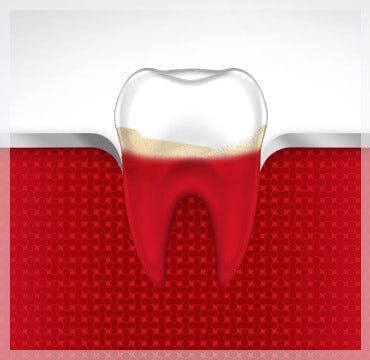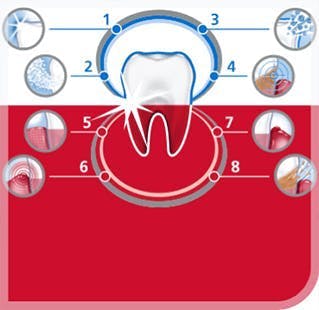Can Gums Grow Back?
Once gums are gone, it is unlikely that they will grow back. 1 The best way to safeguard against gum disease and receding gums is through preventative care.1 In the sections below, we’ll outline what causes receding gums, how to help treat them, and smart oral hygiene habits to develop.
Signs of Receding Gums and Why They Occur
Receding gums are caused by gum disease, which is also known as periodontal disease. Periodontal disease affects the gums, which are the tissues that help to hold our teeth in place (along with the bone).2 When poor dental hygiene habits lead to plaque buildup, periodontal disease can occur and cause a number of issues, including tooth loss in the most extreme cases.2
Along with receding gums, or the appearance of teeth becoming longer, periodontal disease can cause the following symptoms:2,3
- Red or swollen gums
- Persistent bad breath
- Tender gums
- Bleeding gums
- Sensitive teeth
- Pain while chewing
- Loose teeth
- Teeth fitting together differently when you bite
Although anyone can get periodontal disease and experience gum recession, a few factors may increase your risk, including:3
- Smoking and tobacco use
- Having poor dental hygiene
- Genetic factors such as family history of tooth loss
- Taking medications like steroids
- Taking birth control pills that impact hormone levels
- Diseases that affect overall health and the body’s ability to fight infection
Treatment Options for Receding Gums
As mentioned, preventative care and practicing good oral hygiene is your best defense against gum disease. However, if you do have receding gums, there are a few dental procedures that your dentist or periodontist may recommend.
Regenerative Procedure
As mentioned above, getting a procedure to help regenerate bone and gum tissue is possible if you’ve experienced gum recession due to periodontal disease.4 During a regenerative procedure, the periodontist folds back the infected gum tissue, removes the bacteria , and if needed, a membrane or tissue-stimulating protein is placed to help stimulate the body’s regenerative process.4
Gum Graft Surgery
If your gums have receded to the point of exposing the roots of a tooth, you may be eligible for a gum graft surgery.4 Gum graft surgery entails taking gum tissue from your palate or from a donor source to cover the exposed tooth root.4 This procedure serves to reduce tooth sensitivity by covering the root and it helps protect against additional gum recession. You can undergo gum graft surgery on one tooth or on multiple teeth as needed.4
Periodontal Pocket Procedure
If your gum tissue has been destroyed by disease to the point that deep or unmanageable pockets form around your teeth, your periodontist might recommend a periodontal pocket procedure.4 In this surgery, the gum tissue is folded back and the disease-causing bacteria is removed.4 Then the tissue is unfolded and secured back around the tooth.4 This procedure can help your gum tissues fit more securely around your teeth and can help protect against further tissue destruction and potential bone loss.4
Preventative Care
Although there are solutions to help reverse gum recession, taking action to prevent the development of gum disease in the first place is important. Practicing good oral health hygiene is imperative to maintaining a healthy mouth and healthy gums. Some helpful habits to develop include:5
- Brushing your teeth. Brushing your teeth removes plaque from your teeth, which can lead to periodontal disease when not removed. When you brush, use a toothpaste with fluoride to help prevent cavities and strengthen your teeth’s enamel, unless your dental professional has a different recommendation. Angle your toothbrush so that the bristles are toward the gum line, and gently use a small circular motion to clean the gums and teeth. Avoid scrubbing in a back and forth or brushing too hard. Be certain to brush your tongue from back to front starting over with each stroke. Brush your teeth twice a day.
- Floss. Use dental floss at least once a day to remove food particles and plaque buildup between your teeth. If using dental floss is difficult due to arthritis or other flexibility issues, you can ask your dental professional to recommend the best product for you. Some examples could be: a special brush, water flosser, floss threader, or a pick made out of plastic or wood.
- Replace your toothbrush regularly. Replace your toothbrush every three to four months and immediately if the bristles fray.
- Get regular dental checkups. Visiting your dental office for regular checkups and teeth cleanings can help you catch dental issues like gum disease early.
- Quit smoking. If you use tobacco, you have a higher risk of developing gum disease.
While dental medicine has come a long way and there are now procedures to help treat receded gums, practicing good oral hygiene is a smart way to prevent problems before they start. For toothpaste and toothbrushes that can help support healthy gums, check out parodontax’s collection of products.
SOURCES
1. Promising new treatment could regenerate gum tissue and prevent tooth loss. Oral Health Foundation. https://www.dentalhealth.org/news/promising-new-treatment-could-regenerate-gum-tissue-and-prevent-tooth-loss. Accessed 5/26/22.
2. Periodontal (Gum) Disease. National Institute of Dental and Craniofacial Research. https://www.nidcr.nih.gov/health-info/gum-disease. Accessed 5/26/22.
3. Preventing Periodontal Disease. ADA. https://www.mouthhealthy.org/~/media/ADA/Publications/Files/ ADA_PatientSmart_Preventing_Perio.pdf?la=en. Accessed 5/26/22.
4. Surgical Procedures. American Academy of Periodontology. https://www.perio.org/for-patients/periodontal-treatments-and-procedures/surgical-procedures/. Accessed 5/26/22.
5. Oral Hygiene. National Institute of Dental and Craniofacial Research. https://www.nidcr.nih.gov/health-info/oral-hygiene. Accessed 5/26/22.




